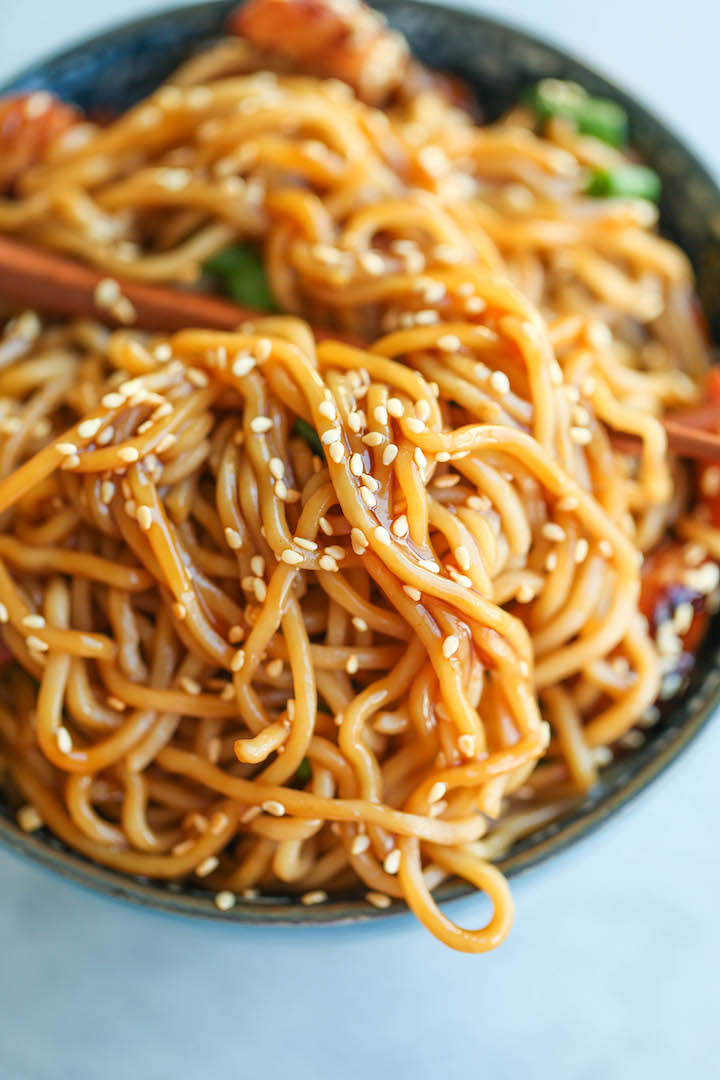Be Golden as gold mine & Green as leaf
carpe diemBe Golden as gold mine & Green as leaf
carpe diemNoodles
Noodles

the information is from:
Though there can be a good deal of variability between different brands and flavors of instantnoodles, most types have certain nutrients in common
Most types of instant noodles tend to be low in calories, fiber and protein, with higher amounts of fat, carbs, sodium and select micronutrients.
One serving of beef-flavored ramen noodles contains these nutrients (2):
- Calories: 188
- Carbs: 27 grams
- Total fat: 7 grams
- Saturated fat: 3 grams
- Protein: 4 grams
- Fiber: 0.9 grams
- Sodium: 861 mg
- Thiamine: 43% of the RDI
- Folate: 12% of the RDI
- Manganese: 11% of the RDI
- Iron: 10% of the RDI
- Niacin: 9% of the RDI
- Riboflavin: 7% of the RDI
Keep in mind that one package of ramen contains two servings, so if you're eating the entire package in one sitting, the amounts above would be doubled.
It's also worth noting that there are some special varieties available that are marketed as healthier options. These may be made using whole grains or have lower amounts of sodium or fat
Are Instant Noodles Bad for You?
Instant noodles are a popular convenience food eaten all over the world.
Though they're inexpensive and easy to prepare, there is controversy over whether or not they have adverse health effects.
This is because they contain few nutrients and high amounts of sodium and MSG.
This article looks at the possible effects of instant noodles on health.
Instant noodles are a type of pre-cooked noodle, usually sold in individual packets or cups and bowls.
Typical ingredients in the noodles include flour, salt and palm oil. The flavoring packets generally contain salt, seasoning and monosodium glutamate (MSG).
After the noodles have been made in the factory, they are steamed, dried and packaged (1).
Each package contains a block of dried noodles as well as a packet of flavoring and/or oil for seasoning. Buyers cook or soak the block of noodles in hot water with the flavoring before eating it.
Popular brands of instant noodles include:
- Top Ramen
- Cup Noodles
- Maruchan
- Mr. Noodles
- Sapporo Ichiban
- Kabuto Noodles
Summary: Instant noodles are pre-cooked noodles that have been steamed and dried. They're usually soaked in hot water before they're eaten.
Though there can be a good deal of variability between different brands and flavors of instant noodles, most types have certain nutrients in common.
Most types of instant noodles tend to be low in calories, fiber and protein, with higher amounts of fat, carbs, sodium and select micronutrients.
One serving of beef-flavored ramen noodles contains these nutrients (2):
- Calories: 188
- Carbs: 27 grams
- Total fat: 7 grams
- Saturated fat: 3 grams
- Protein: 4 grams
- Fiber: 0.9 grams
- Sodium: 861 mg
- Thiamine: 43% of the RDI
- Folate: 12% of the RDI
- Manganese: 11% of the RDI
- Iron: 10% of the RDI
- Niacin: 9% of the RDI
- Riboflavin: 7% of the RDI
Keep in mind that one package of ramen contains two servings, so if you're eating the entire package in one sitting, the amounts above would be doubled.
It's also worth noting that there are some special varieties available that are marketed as healthier options. These may be made using whole grains or have lower amounts of sodium or fat.
Summary: The majority of instant noodles are low in calories, fiber and protein, but high in fat, carbs, sodium and some micronutrients.
With 188 calories per serving, instant noodles are lower in calories than some other types of pasta (2).
A serving of pre-packaged lasagna, for example, contains 377 calories, while a serving of canned spaghetti and meatballs has 257 calories (3, 4).
Because instant noodles are lower in calories, eating them could potentially lead to weight loss.
On the other hand, many people eat the whole noodle pack in one sitting, meaning they're actually consuming two servings.
It's also important to note that instant noodles are low in fiber and protein, which may not make them the best option when it comes to weight loss.
Protein has been shown to increase feelings of fullness and decrease hunger, making it a useful tool in weight management (5, 6).
Fiber, on the other hand, moves slowly through the digestive tract, helping to promote feelings of fullness while enhancing weight loss (7, 8).
With only 4 grams of protein and 1 gram of fiber per serving, a serving of instant noodles likely won't make much of a dent in your hunger or fullness levels. So despite being low in calories, it may not benefit your waistline (2).
Despite being relatively low in some nutrients like fiber and protein, instant noodles contain several micronutrients, including iron, manganese, folate and B vitamins.
Some instant noodles are also fortified with additional nutrients.
In Indonesia, about half of instant noodles are fortified with vitamins and minerals, including iron. One study actually found that consuming iron-fortified milk and noodles can decrease the risk of anemia, a condition caused by iron deficiency (9).
Additionally, some instant noodles are made using fortified wheat flour, which has shown potential in increasing micronutrient intake without changing the taste or texture of the final product (10).
Research has also shown that eating instant noodles could be associated with an increase in the intake of certain micronutrients.
A 2011 study compared the nutrient intake of 6,440 instant noodle consumers and non-instant noodle consumers.
Those who consumed instant noodles had a 31% greater intake of thiamine and a 16% higher intake of riboflavin than those who did not eat instant noodles (11).
Most instant noodles contain an ingredient known as monosodium glutamate (MSG), a common food additive used to enhance flavor in processed foods.
Though the FDA recognizes MSG as safe for consumption, its potential effects on health remain controversial (12).
In the US, products that contain added MSG are required to say so on the ingredients label (12).
MSG is also naturally found in products such as hydrolyzed vegetable protein, yeast extract, soy extract, tomatoes and cheese.
Some studies have linked extremely high MSG consumption to weight gain and even increased blood pressure, headaches and nausea (13, 14).
However, other studies have found no association between weight and MSG when people consume it in moderate amounts (15).
Some research has also suggested MSG may negatively impact brain health. One test-tube study found that MSG could cause swelling and death of mature brain cells (16).
Nevertheless, other research has shown that dietary MSG likely has little effect on brain health, since even large amounts are not able to cross the blood-brain barrier (17).
Though MSG is likely safe in moderation, some people may have a sensitivity to MSG and should limit their intake.
This condition is known as the MSG symptom complex. Sufferers may experience symptoms such as headaches, muscle tightness, numbness and tingling
Are Instant Noodles Bad for You?

Instant noodles are a popular convenience food eaten all over the world.
Though they're inexpensive and easy to prepare, there is controversy over whether or not they have adverse health effects.
This is because they contain few nutrients and high amounts of sodium and MSG.
This article looks at the possible effects of instant noodles on health.
Instant noodles are a type of pre-cooked noodle, usually sold in individual packets or cups and bowls
Typical ingredients in the noodles include flour, salt and palm oil. The flavoring packets generally contain salt, seasoning and monosodium glutamate (MSG).
After the noodles have been made in the factory, they are steamed, dried and packaged (1).
Each package contains a block of dried noodles as well as a packet of flavoring and/or oil for seasoning. Buyers cook or soak the block of noodles in hot water with the flavoring before eating it.
Popular brands of instant noodles include:
- Top Ramen
- Cup Noodles
- Maruchan
- Mr. Noodles
- Sapporo Ichiban
- Kabuto Noodles
Summary: Instant noodles are pre-cooked noodles that have been steamed and dried. They're usually soaked in hot water before they're eaten.
If you do enjoy the occasional cup of noodles, there are ways to make it healthier.
Picking instant noodles made from whole grains, for example, can increase fiber content and boost feelings of fullness.
Lower-sodium instant noodles are also available and can help bring down your sodium intake for the day.
Dr. McDougall's, Koyo and Lotus Foods are just a few brands that sell some healthier varieties of instant noodles.
You can also use your instant noodles as a base and top them with some healthy ingredients to make a more well-rounded meal.
Throwing in some vegetables and a good source of protein can enhance the nutrition profile of your instant noodle dinner.
.






